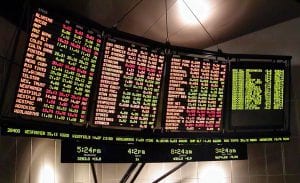
Updated May 11, 2024
The Psychology of Investing: An Interplay of Emotions and Financial Decisions
Investing is not merely a mechanical process of number-crunching; it’s a psychological tapestry woven with threads of human emotions. The interplay between the mind and the market is a fascinating tug-of-war requiring mental fortitude and financial acumen. The importance of psychological resilience cannot be overstated when investing.
Discipline, patience, and composure are the psychological qualities imperative to successful investing. For instance, discipline in sticking with a well-thought-out investment plan, patience in waiting for the right opportunity to act, and composure in dealing with the inevitable ups and downs of the market enable investors to transcend the limitations of human fallibility that often lead to counterproductive financial decisions.
However, the human psyche is not infallible. The lure of instant wealth and the fear of missing out on lucrative opportunities often create confusion. This ambiguity can lead to hasty, impulsive decisions, jeopardising long-term investment goals. The tangled web of human emotions can distort the clarity of thought necessary for successful investing.
Drawing parallels from the entertainment world, Sacha Baron Cohen’s perspective on building an audience offers an intriguing insight. His approach of standing out by presenting a bold and unique viewpoint is a refreshing departure from the conventional wisdom of trying to please everyone. This philosophy can be mirrored in investing. A clearly defined investment strategy and the courage to diverge from popular opinion when necessary can yield substantial results.
Investing is a journey that demands a clear vision and an unwavering commitment – it’s a dance between the mind and the market. The winning strategy lies in understanding the interplay of emotions and financial decisions and mastering the art of balancing the two.
The Hive Mind Phenomenon: Its Influence on Investment Decisions
There’s a formidable phenomenon at play in the investing world, one that harnesses collective consciousness and moulds it into a formidable force. It’s known as the hive mind. This concept is born from the collaborative and competitive interactions among numerous individuals, creating a collective intelligence that can significantly influence market trends and investment movements.
The hive mind manifests itself in the shifting sands of market trends. For instance, this collective consciousness can steer the price of commodities such as palladium. It’s as if many minds merge into a single entity, driving the mechanics of the market with their combined might.
Yet, much like any phenomenon, the hive mind is not flawless. It’s a double-edged sword that can lead to spectacular peaks or devastating troughs in the market. The hive mind can orchestrate financial bubbles that inflate with the exuberance of the masses, only to burst when the collective sentiment shifts. Similarly, it can engineer market crashes when fear overtakes reason, and individuals move as a herd, driven more by emotions than rational analysis.
However, while the hive mind is influential, it’s not the ultimate compass for investment decisions. Successful investing requires independent thinking, a discerning eye for potential, and a focus on long-term gains over short-term trends. It’s about understanding the market’s pulse but not getting swept away by its rhythm.
The hive mind phenomenon is a powerful instrument, but it’s one of many instruments in the symphony of investing. The melody of success is composed not by unthinkingly following the hive mind but by harmonizing it with individual judgment and long-term vision.
The Emotional Roller Coaster: Navigating Through Fear and Greed
The investing world can be likened to an emotional roller coaster, where valleys of despair often follow the peaks of exhilaration. Fear and greed, the two driving forces behind this ride, play a significant role in shaping investors’ decisions, frequently leading them through a whirlwind of highs and lows.
Fear, the first of this duo, is a potent force that can cloud judgment and trigger hasty decisions. The icy hand compels investors to sell off their investments in the face of a market downturn. The fear of losing it all can sometimes lead to a panicked exodus, even when holding on might be the more rational choice.
On the other hand, greed is the siren that lures investors into buying assets at inflated prices during a market bubble. The golden promise of quick riches closes their eyes to the risks of overvaluation, leading them to leap without looking at the potential pitfalls.
However, the key to successful investing lies in taming these emotional beasts and anchoring decisions on rational analysis and long-term investment goals. A disciplined approach, undeterred by the gusts of fear or the allure of greed, can guide investors through the tumultuous seas of the market.
The importance of this disciplined approach becomes particularly evident in volatile markets, such as the palladium market. With prices swinging wildly within short periods, it’s crucial to stay focused on the fundamental value of the investment. By navigating the emotional roller coaster with a steady hand and a clear mind, investors can make sound investment decisions and confidently ride the waves of the market.
The Role of Mass Psychology in Timing the Market
Mass psychology plays a significant role in market dynamics, often dictating the ebb and flow of investment trends. By understanding and capitalizing on these psychological patterns, savvy investors can frequently find advantageous entry points and thrive where others falter.
A prime example is the late 90s and early 2000s Dotcom Bubble. As internet-related companies began to emerge, the excitement and optimism around the potential of this new technology led to a surge in investments. This hype, fueled mainly by mass psychology, drove up the prices of these tech stocks to unsustainable levels, creating a bubble. However, astute investors who recognized the influence of mass psychology could see that this euphoria was not rooted in these companies’ actual value or profitability and decided to hold off on investing.
When the bubble eventually burst and the market crashed, many investors panicked and started selling off their shares, driving prices down even further. However, this crash presented a golden opportunity for those previously held off. They could buy into these companies at significantly reduced prices, capitalizing on the fear and pessimism that had taken over the market. As the tech sector eventually recovered and grew in the subsequent years, these investors reaped the benefits of their contrarian approach.
This example underscores the importance of understanding mass psychology in investing. Periods of market euphoria often lead to inflated prices and investment bubbles, while market crashes, driven by fear and panic, can present valuable buying opportunities. Investors frequently find profitable opportunities in these market fluctuations by going against the grain and not succumbing to the crowd’s emotions.
Conclusion: The Interplay of Psychology and Investing
Investing is a multifaceted discipline that combines financial acumen with a deep understanding of human psychology. The allure of quick profits, the fear of missing out, and the influence of mass psychology are potent forces that can sway investor behaviour and shape market trends.
As historical events like the Dotcom Bubble demonstrate, mass psychology can significantly create investment bubbles and subsequent market crashes. While often driven by short-term sentiment, these extreme optimism and pessimism periods can give astute investors valuable opportunities. Contrarian investors who resist the emotional whims of the crowd and adhere to rational analysis can often capitalize on these market distortions.
Yet, successful investing requires more than just understanding and exploiting psychological biases. It needs a clear and disciplined investment strategy, a focus on long-term value, and the courage to make independent decisions even when they go against popular sentiment.
In the complex world of investing, the interplay of psychology and financial decisions is a crucial element that can often spell the difference between success and failure. By understanding this dynamic, investors can navigate the emotional landscape of the market and make better-informed decisions that align with their investment goals.
Mind-Bending Reads: Thought-Provoking Gems
Valeant Shares Slump



